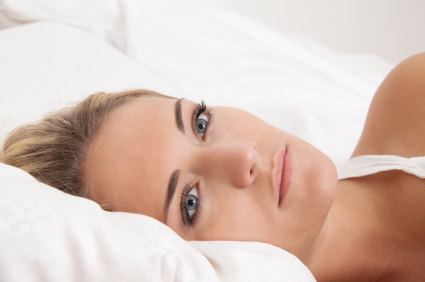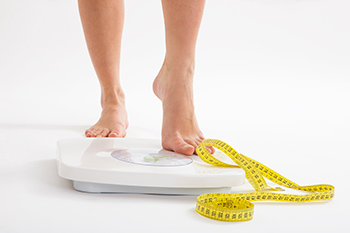Sleep apnea is a sleep disorder in which breathing starts and stops. When left untreated, this condition can lead to things like daytime tiredness, loud snoring, or more serious health complications such as high blood pressure and heart trouble. It is important to note that this condition is different from primary snoring in several ways.
Patients who have sleep apnea:

Obstructive Sleep Apnea: airways become blocked during sleep
Central Sleep Apnea: brain fails to signal airways to open
There is some research that indicates there is a connection between sleep apnea and weight gain. In this article, we’ll explore this link and what you can do to treat your sleep apnea and manage your weight.
Sleep apnea is common in those who are considered obese. Obesity is believed to be a reversible cause of sleep apnea, which means the condition will resolve if the weight can be lost. Unfortunately, sleep apnea can cause weight gain, which makes it harder to lose weight.
First of all, sleep apnea prevents you from getting a good night’s rest. When you don’t get enough sleep, you tend to be hungrier. This leads to consuming more calories than your body needs, especially from carb- and calorie-dense foods. These additional calories lead to weight gain.
Another issue caused by sleep apnea is fatigue. If you’re not getting enough sleep, you don’t have the energy to engage in physical activity. If you are not physically active, you’re not burning the calories, you’re consuming.
While lack of sleep can have a detrimental impact on anyone, regardless of age, it has a significant impact on adolescents. This is a critical time of brain growth/development, which is negatively impacted by lack of sleep.
Sleep apnea may also cause hormones such as ghrelin and leptin to change, which can cause your appetite to become dysregulated.

Since these hormones are off track, you feel hungry all the time and rarely feel full, causing you to consume too many calories. Your body stores the excess calories as fat which leads to weight gain.
While there is a link between sleep apnea and weight gain, there are some things you can do to treat both issues.
Most healthcare providers recommend lifestyle changes for mild cases of sleep apnea, including quitting smoking or weight loss. Another recommendation is to change your sleep position. If you have allergies, your provider may recommend allergy treatment. If these do not work, you do have other options:
If these do not work, your healthcare provider may want to discuss surgical options, such as:
Research shows that weight loss can reduce the symptoms of sleep apnea- but weight loss when you have this sleep condition can be difficult. There are a few things you can do though:
Many patients have questions about the relationship between sleep apnea and weight issues. Below are some of the most frequent questions:
Yes, there is some research that indicates weight loss can improve symptoms of sleep apnea. In fact, research has shown that 10% to 15% weight loss can lead to a 30% to 50% reduction in the severity of sleep apnea.
Yes, sleep apnea can cause additional health problems such as high blood pressure, heart disease, stroke, heart failure, depression, memory loss, type 2 diabetes, acid reflux, metabolic syndrome, and more.
The best way to confirm a sleep apnea diagnosis is with a sleep study. However, there are certain signs that indicate you should seek a diagnosis:
Most providers recommend lifestyle changes such as quitting smoking, weight loss, or changing your sleep position. However, if these do not work, you may want to consider:
Yes, research shows that sleep apnea is more common in those who are obese than in those who are not.
Sleep apnea is a common sleep disorder characterized by interruptions in breathing while sleeping. There is some research that there is a link between weight gain and sleep apnea.
Unfortunately, it seems that sleep apnea causes weight gain- and obesity is a common contributor to sleep apnea. However, there are some ways that you can break this cycle.
First of all, treat your sleep apnea. Once you get your sleep apnea under control and start getting better sleep, you should have the energy to start burning off the calories you consume. The best way to treat sleep apnea is to consult with a professional.
Get Answers